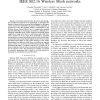Free Online Productivity Tools
i2Speak
i2Symbol
i2OCR
iTex2Img
iWeb2Print
iWeb2Shot
i2Type
iPdf2Split
iPdf2Merge
i2Bopomofo
i2Arabic
i2Style
i2Image
i2PDF
iLatex2Rtf
Sci2ools
INFOCOM
2007
IEEE
2007
IEEE
Bandwidth Balancing in Multi-Channel IEEE 802.16 Wireless Mesh Networks
Abstract— In wireless mesh networks, the end-to-end throughput of traffic flows depends on the path length, i.e. the higher the number of hops, the lower becomes the throughput. In this paper, a Fair End-to-end Bandwidth Allocation (FEBA) algorithm is introduced to solve this problem. FEBA is implemented at the Medium Access Control (MAC) layer of single-radio, multiple channels IEEE 802.16 mesh nodes, operated in a distributed coordinated scheduling mode. FEBA negotiates bandwidth among neighbors to assign a fair share to each end-to-end traffic flow. This is carried out in two steps. First, bandwidth is requested and granted in a round-robin fashion where heavily loaded links are provided with a proportionally higher amount of service than the lightly loaded links at each round. Second, at each output link, packets from different traffic flows are buffered in separate queues which are served by the Deficit Round Robin (DRR) scheduling algorithm. If multiple channels are avai...
Related Content
| Added | 03 Jun 2010 |
| Updated | 03 Jun 2010 |
| Type | Conference |
| Year | 2007 |
| Where | INFOCOM |
| Authors | Claudio Cicconetti, Ian F. Akyildiz, Luciano Lenzini |
Comments (0)

